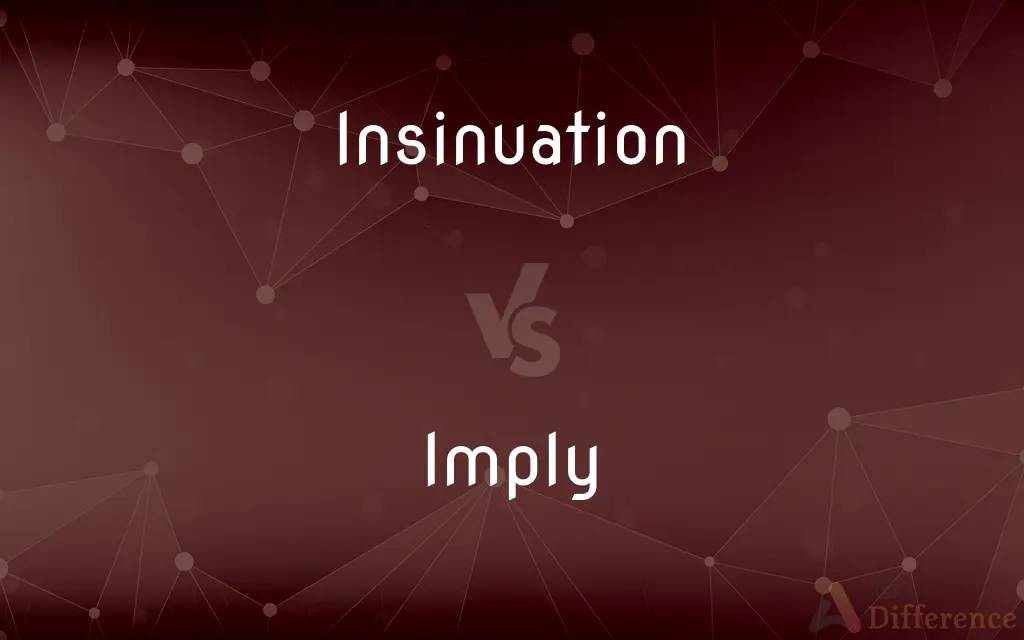Insinuation vs. Imply — What's the Difference?
By Tayyaba Rehman & Fiza Rafique — Updated on April 24, 2024
Insinuation involves subtly suggesting something negative or dubious, often in a covert manner; whereas to imply means to indicate an idea or conclusion indirectly through communication.

Difference Between Insinuation and Imply
Table of Contents
ADVERTISEMENT
Key Differences
Insinuation is typically used to convey a negative or dubious suggestion subtly, leveraging tone, gesture, or indirect language, while implying is a broader communicative act that involves suggesting something without stating it explicitly.
Insinuation often carries a connotation of deceit or manipulation, as it is usually used to introduce an idea stealthily, whereas implying is a neutral act of communication that can be used in various contexts, not necessarily with negative intent.
The method of insinuation can include hints, innuendos, or leading questions designed to plant an idea covertly. On the other hand, implying relies more on the logical connection that the listener or reader is expected to make based on the given information.
Insinuation requires a certain level of interpretation and awareness of context to be understood, which can make it more subjective. In contrast, what is implied can often be inferred through more straightforward logical reasoning.
The effectiveness of insinuation depends heavily on the recipient’s perception and awareness of the subtleties of communication, whereas the effectiveness of an implication depends more on the clarity of the hint or context provided by the speaker or writer.
ADVERTISEMENT
Comparison Chart
Definition
Suggesting something negative subtly
Suggesting something indirectly
Connotation
Often negative or manipulative
Neutral, based on context
Communication Method
Hints, innuendos, leading questions
Logical connections, indirect speech
Dependency
High on recipient's perception
High on logical context and clarity
Typical Usage Context
Conversations, criticisms
Academic discussions, everyday speech
Compare with Definitions
Insinuation
An indirect suggestion or implication, often with a harmful intent.
The insinuation that he was not trustworthy lingered in the air.
Imply
To indicate or suggest something indirectly.
His comments implied a lack of confidence in the team.
Insinuation
A subtle hint towards something generally negative.
His insinuation about her work ethic made her uncomfortable.
Imply
To hint at something without direct statement.
She implied that they were more than just friends.
Insinuation
A covert indication of something derogatory.
She didn't appreciate his insinuation that she was lying.
Imply
To suggest something without explicitly stating it.
His silence implied agreement.
Insinuation
A crafty hint or suggestion.
The insinuation in his tone was clear to all present.
Imply
To express something indirectly through what one says or writes.
The author implied a deep discontent with the status quo.
Insinuation
An implied accusation or suggestion.
His insinuation of bias created an awkward silence.
Imply
To convey an idea indirectly.
The sign by the door implied that entry was not allowed.
Insinuation
The act, process, or practice of insinuating.
Imply
To express or state indirectly
She implied that she was in a hurry.
Insinuation
Something insinuated, especially an artfully indirect, often derogatory suggestion.
Imply
To make evident indirectly
His fine clothes implied that he was wealthy. See Usage Note at infer.
Insinuation
The act or process of insinuating; a creeping, winding, or flowing in.
Imply
To have as a necessary consequence
The proposition that "all dogs are mammals" implies that my dog is a mammal.
Insinuation
The act of gaining favor, affection, or influence, by gentle or artful means; — formerly used in a good sense, as of friendly influence or interposition.
Imply
To suggest by logical inference
When I state that your dog is brown, I am not implying that all dogs are brown.
Insinuation
The art or power of gaining good will by a prepossessing manner.
Imply
To hint; to insinuate; to suggest tacitly and avoid a direct statement
What do you mean "we need to be more careful with hygiene"? Are you implying that I don't wash my hands?
Insinuation
That which is insinuated; a hint; a suggestion, innuendo or intimation by distant allusion
Slander may be conveyed by insinuations.
Imply
(archaic) to enfold, entangle.
Insinuation
The act or process of insinuating; a creeping, winding, or flowing in.
By a soft insinuation mix'dWith earth's large mass.
Imply
To infold or involve; to wrap up.
Insinuation
The act of gaining favor, affection, or influence, by gentle or artful means; - formerly used in a good sense, as of friendly influence or interposition.
I hope through the insinuation of Lord Scarborough to keep them here till further orders.
Imply
To involve in substance or essence, or by fair inference, or by construction of law, when not include virtually; as, war implies fighting.
Where a malicious act is proved, a malicious intention is implied.
When a man employs a laborer to work for him, . . . the act of hiring implies an obligation and a promise that he shall pay him a reasonable reward for his services.
Insinuation
The art or power of gaining good will by a prepossessing manner.
He bad a natural insinuation and address which made him acceptable in the best company.
Imply
To refer, ascribe, or attribute.
Whence might this distaste arise?
If [from] neither your perverse and peevish will.To which I most imply it.
Insinuation
That which is insinuated; a hint; a suggestion or intimation by distant allusion; as, slander may be conveyed by insinuations.
I scorn your coarse insinuation.
Imply
Express or state indirectly
Insinuation
An indirect (and usually malicious) implication
Imply
Suggest as a logically necessary consequence; in logic
Insinuation
The act of gaining acceptance or affection for yourself by persuasive and subtle blandishments;
She refused to use insinuation in order to gain favor
Imply
Have as a logical consequence;
The water shortage means that we have to stop taking long showers
Imply
Suggest that someone is guilty
Imply
Have as a necessary feature or consequence; entail;
This decision involves many changes
Common Curiosities
Is implying always intentional?
Implying can be both intentional and unintentional, depending on how the speaker or writer frames their communication.
What is the main difference between insinuation and imply?
Insinuation is often negative and subtle, implying something covertly, while imply is a neutral and indirect suggestion.
How can someone tell if something was implied?
Implications are often recognized through context and the logical connections between statements.
What makes insinuation potentially manipulative?
Insinuation can be manipulative as it often introduces ideas or accusations subtly and without direct evidence, relying on the audience’s inference.
Can insinuation be positive?
Typically, insinuation has a negative connotation, although creatively, it might be used neutrally or positively in rare contexts.
How does cultural context affect the interpretation of insinuations and implications?
Cultural context significantly affects how insinuations and implications are interpreted, as different cultures may have varying norms and understandings of indirect communication and subtlety.
Can implying be considered a form of lying?
Implying is not necessarily considered lying, as it involves suggesting something indirectly without making a false statement. However, it can contribute to misunderstandings or deceit if used manipulatively.
How can one effectively use implication in communication?
Effective use of implication in communication involves ensuring that the context is clear, the audience is capable of making the intended inferences, and the hints are neither too obscure nor too obvious.
What are common scenarios where insinuation is used?
Insinuation is commonly used in scenarios where direct accusation or confrontation is avoided, such as in political speech, gossip, or subtle criticism in social settings.
Why might someone choose to insinuate rather than state something outright?
Someone might choose to insinuate rather than state something outright to avoid direct responsibility for making a controversial or offensive statement, to preserve social harmony, or to probe a sensitive topic without overt conflict.
Share Your Discovery

Previous Comparison
Paramount vs. Tantamount
Next Comparison
Staid vs. StayedAuthor Spotlight
Written by
Tayyaba RehmanTayyaba Rehman is a distinguished writer, currently serving as a primary contributor to askdifference.com. As a researcher in semantics and etymology, Tayyaba's passion for the complexity of languages and their distinctions has found a perfect home on the platform. Tayyaba delves into the intricacies of language, distinguishing between commonly confused words and phrases, thereby providing clarity for readers worldwide.
Co-written by
Fiza RafiqueFiza Rafique is a skilled content writer at AskDifference.com, where she meticulously refines and enhances written pieces. Drawing from her vast editorial expertise, Fiza ensures clarity, accuracy, and precision in every article. Passionate about language, she continually seeks to elevate the quality of content for readers worldwide.














































